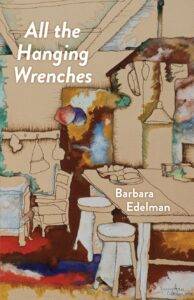Longlisted as a Publisher’s Weekly notable book of poetry for 2022
From the Publisher: “In the wry and tender poems of Barbara Edelman’s All the Hanging Wrenches, we encounter creatures both wild and domestic; family, friends, strangers, and history, all deftly transfigured through poignant turns of phrase. Edelman’s delight in wordplay is contagious. Time and the boundaries of memory are fluid amid adventures, reflection, and the glorious contradictions that are real life. ‘At the shoreline where waves flowed through windows in rock, we rode in and came out changed, our brains full of ocean,’ Edelman writes. With great good humor and sadness in equal portion, this is a book of quiet triumph in which all the ghosts abide…”
More Info About the Author: “Barbara Edelman’s poetry collections include All the Hanging Wrenches (2022) and Dream of the Gone-From City(2017), both from Carnegie Mellon University Press, and the chapbooks Exposure and A Girl in Water . Her poems and short prose have appeared in Pleiades, Prairie Schooner, Raleigh Review, Rattle, and Spillway, among other journals, and in several anthologies. Her one-act play, “Charades” was produced by the Pittsburgh New Works Festival. A professor emerita and current part time instructor of English at the University of Pittsburgh, Edelman has taught courses in creative writing, literature, and composition, and served as co-coordinator of the Writerś Café for ten years. She has worked locally as a freelance editor and grant writer and has held the teaching positions of Poet in Residence at the Ellis School, Adjunct Assistant Professor at Carnegie Mellon, Poetry and Playwriting Instructor at the Pittsburgh Center for the Arts, and Visiting Writer at Waynesburg University. Her website is barbaraedelman1.wordpress.
Author Website “The terrific, Barbara Edelman styled ode holds the scrutiny of a Wislawa Szymborska image and the charm of a Chuck Kinder sentence. It treks inner and outer landscapes, landscapes of song and silence, of immediacy and memory. The spirit of toughness wires every one of these wonderful poems, along with a mischievous candor that stokes trust and intimacy. All the Hanging Wrenches is rooted in the brilliance of Edelman’s debut collection, but the wiring lights up whole new parts of the mind.” – Terrance Hayes, MacArthur Fellow & National Book Award Winner, author of American Sonnets for my Past and Future Assassin
“If you’re lucky and have been among a crowd mesmerized by Barbara Edelman’s voice, comic timing, and knowingness-a knowingness both cutting and botanical, like a great gin-then you have some idea what awaits you here. These poems prowl and slink. They gambol; they are ruminant; they encircle you and explode, finally, into elegy. There should be much more time, the poems say without saying, ‘to sleep brilliantly, pay attention.; Edelman is a gem.” – Joy Katz, author of All You Do is Perceive, The Garden Room, and Fabulae
“All the Hanging Wrenches is a spiraling, circling odyssey through languages, the globe, the besieged natural world, and the human life cycle. ‘Each trek has its own syntax.’ These poems nudge beauty out of fog, distances, and noise; they take stock of loss, aging, dreamed and lived realities-each hewing its own syntax marked by flint-struck images, mordant humor, and surprising diction and detail. There are too many taps on the sternum enacted by these poems to list; Edelman’s poetic toolbox has been put to stunning use in constructing this work.” – Ellen McGrath Smith, author of Nobody’s Jackknife and Scatterfeed
Exoskeleton
 Each trek has its own syntax.
Each trek has its own syntax.
My home on my back. My Quasimodo
shadow. I’m a slow beetle. Destination,
the top of a mountain, the Milky Way’s
veil and the silence. Each time I wake
in the night there’s a new sky. The earth
spins faster up here.
Each time we rest in the desert,
I sleep; each time I sleep I dream
in stick figures. We are lower
than ocean. I slog across a ridge
to bury my dung. Night brings
an anarchist wind. The tent is a flight
risk. Under the Milky Way’s map,
I dance on a sand hill
like a beetle on its dung ball.
Beneath the canoe, a school of dying
salmon. They rot as they swim.
Their disappearance begins on the inside.
They’ll become the river and the banks
of the river and food for the fry
of their fry. At the falls where they leap,
one Grizzly eats only
the skin. Gulls take the flesh.
Once, I lived beneath a mountain range
of roofs. Pigeons
stood watch on the shingles.
Once, I lived in a sweet stucco box
with vines at the windows, spiders
in the vines, guitar in the alley,
salt on the wind.
Otsego Street
I left the alley and its dust. I left the white cat who was already gone. I left the talkative crows, the smell of weed. I took the bruise of theft. I took the cat-piss smell of eucalyptus, smell of smog, smell of self, smell of flat-land dwellers on days when your sweat evaporates before you see it, when the circular valley is a furnace and you conserve your movements like money, you walk as if you had no bones, you walk as if the air is water, though the only water is in the spiked scales of cacti or escaping through the pores of your skin.
After Ray Carver via John Straley
What if I said the word scream
and typed the word sweet
and hit send?
Would you think of summer—
bike trail through a canopy
of pine, brown needles laced
across asphalt,
and then the drape of rain
that makes its own
element, and white mist
rising from the creek?
Would you think of cycling
through darkness, the discs
of your wheels lit like moons?
Would you think
of all the languages
in which you know the words
for day and night?
I know I manufacture more anger
than my body can outride.
And that my body of anger
needs its own garage. And that
garage is just one B away
from garbage.
But as I write you, the sky
begins to soften its way to darkness,
pinkening in increments
against new-leaved trees.
This excerpt is published here courtesy of the authors and publisher and should not be reprinted without permission.

























